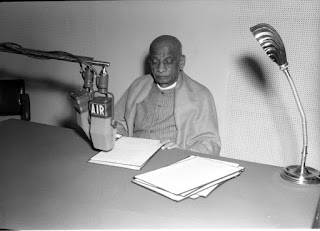ખેડા સત્યાગ્રહ - ૧
[તા. ૧૮-૦૪-૧૯૧૮ના રોજ ખેડા સત્યાગ્રહ દરમ્યાન રાસ ગામે કાંઠાના ખેડુતોની સભા સમક્ષ આપેલું ભાષણ]
આજે આ કાંઠાની ભૂમિ મહાત્માશ્રીનાં પગલાંથી પાવન થઈ છે. બોરસદ તાલુકાના લોકો આખા જિલ્લામાં તોફાનીમાં તોફાની ગણાય છે. અને ખાસ કરીને કાંઠાના લોકો ઘણા તોફાની છે એમ કહેવાય છે.
હવે સત્યાગ્રહની લડત કાંઠામાં શરૂ થઈ છે, માટે આપણે ટંટો, લૂંટફાટ અને દગા વગેરે છોડી દેવાં જોઈએ, અને ન્યાયને રસ્તે ચાલવું જોઈએ. તમારામાં જે ઝનૂન હોય તેને ન્યાયને રસ્તે લડતાં વાપરવું. તમારી શક્તિનો ખોટો ઉપયોગ કરવો નહીં. ધારિયાં ઉગામવાનું છોડી દેવું. ભાઈચારો રાખવો. વિનયથી, વિવેકથી ચાલવું. આપણા જે હક્ક હોય તે મક્કમપણે માંગવા. મામલતદારોની બીક છોડી દેવી. હકની વાત હિંમતથી કહેવી. મામલતદારથી તમે હલકા નથી. કેટલીક વખત તો એવું હોય છે કે મામલતદાર પાસે 25 વીઘાંયે જમીન હોતી નથી. આપણે તેને ત્યાં સીધું જોખવા નહીં જવું. સત્કાર કરવો તો ઘેર બોલાવીને. તેના દાબથી, તેના રૂઆબથી ડરવું નહી, પરંતુ નિર્ભય બનવુ. આપણી લડતનો મુખ્ય હેતુ એ છે કે પ્રજામાંથી ભય કાઢી નાખવો, કુચાલ, કુસંપ, ટંટો-ફિસાદ દૂર કરવાં.
સરકાર તમને ખૂબ તાવશે, તમને દુ:ખ પણ આપશે. પણ દુ:ખ વિના સુખ નથી. સમજીને દુ:ખ વેઠવું એ સારામાં સારો રસ્તો છે. હું. જાણું છું કે તમને સીધે રસ્તે ચઢાવ્યા હોય તો ચઢી શકો એવા છો. આપણી લડતમાં ધર્મનું તત્વ વધું છે. મહાત્માજી તરફ તમે એટલો બધો પ્રેમ બતાવ્યો છે કે મહાત્માજીએ બતાવેલો રસ્તો તમે પકડી રાખશો એવી મારી ખાતરી છે.
સરકાર શું કરશે? જપ્તીઓ કરશે. ચોથાઈ ચઢાવશે, જમીન ખાલસા કરશે. પરંતુ તમે કોઈ પણ જાતનું તોફાન ન કરશો. મે જોયું છે કે તમારે ત્યાં જપ્તી થાય ત્યારે તમે ધારિયાં ઉછાળો છો. પરંતુ હવે તો આપણે લાકડીયે ઉગામવી નહી. જમીન ખાલસા કરે તો કાંઈ આખા ગામની જમીન ખાલસા ન થાય. તમારી જમીનમાં તો તમે જ હળ ઘાલશો. તમે જાણો છો કે એક કુંભાર પણ ગધેડા ઉપર પહેલાં એક મણ ભાર મૂકે, તે ખેંચે તો પાછો અધમણ ભાર વધારે, એમ કરી કરીને તેની પાસે બે મણ બોજો ખેંચાવે છે. તેમ જ સરકાર પણ તમે જેમ જેમ બોજો સહન કરતા જાઓ છો તેમ તેમ વધારે બોજો તમારા ઉપર મૂકે છે. તમે જે બોજાને અત્યાર સુધી સહન કર્યો છે તેને ફેંકી દો ને નિર્ભય થઈને બેસી જાઓ. સાચું છે તે અનુસરો પછે સરકાર પણ કહેશે કે પ્રજા નિર્માલ્ય નથી.
છેવટમાં મારી વિનંતી છે કે આકાશને પાતાળ એક થઈ જાય તોપણ તમારી પ્રતિજ્ઞા તોડશો નહી. તેમ કરશો તો ખેડા જિલ્લાનું નામ હિંદના ઈતિહાસમાં પહેલું લખાશે. આખા હિંદુસ્તાનની આંખ અત્યારે તમારી ઉપર છે. રૈયત જે ઈંસાફ માગે તે ઈંસાફ સરકારને આપવો જ પડે. જો પ્રજાબળ એકત્ર થાય તો કોઈ પણ સરકાર તેની સામે થઈ શકતી નથી. આ સરકાર તો પોતાને ન્યાયી કહેવડાવે છે, તેનાથી તો એમ થઈ જ કેમ શકે?
આ પ્રતિજ્ઞા પાળવામાં જ તમારી ભવિષ્યની પ્રજાનું બહેતર થવાનું છે.
આ લેખ ગમ્યો હોય તો બને તેટલો બીજાને મોકલજો. આભારSource : Sardar Patel na Bhashano






